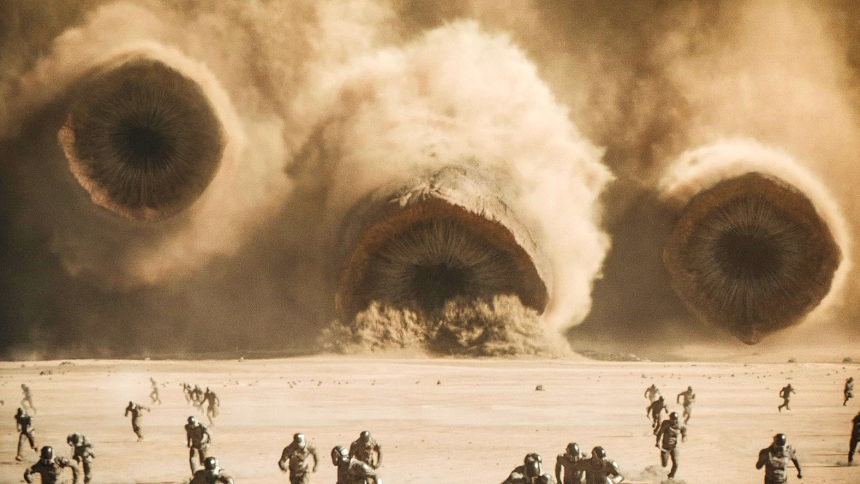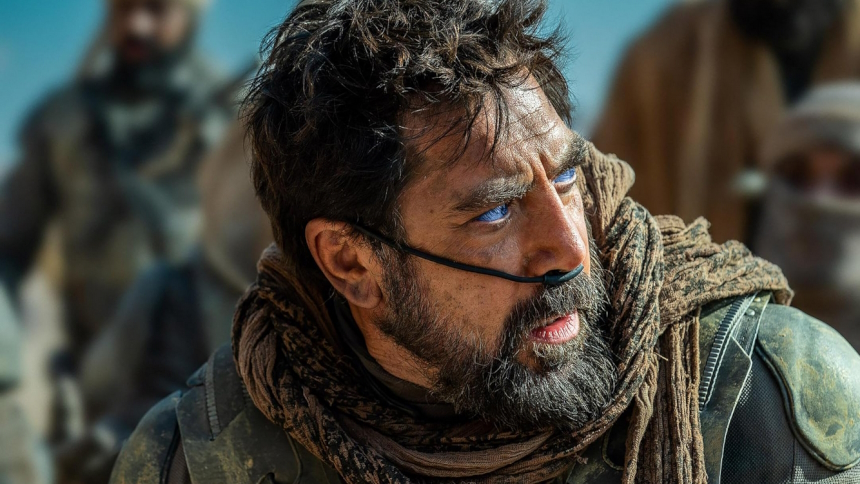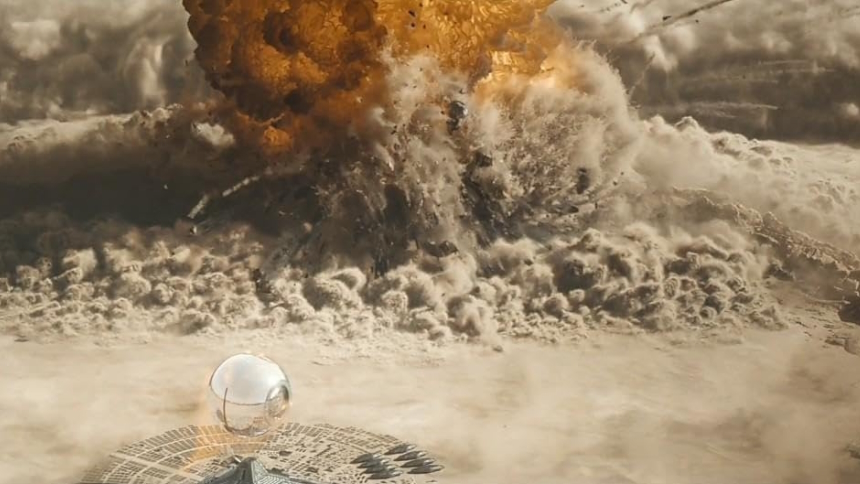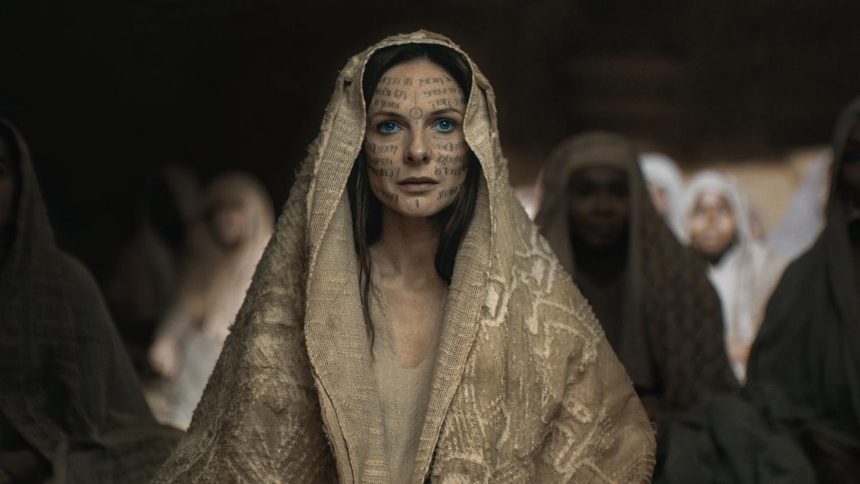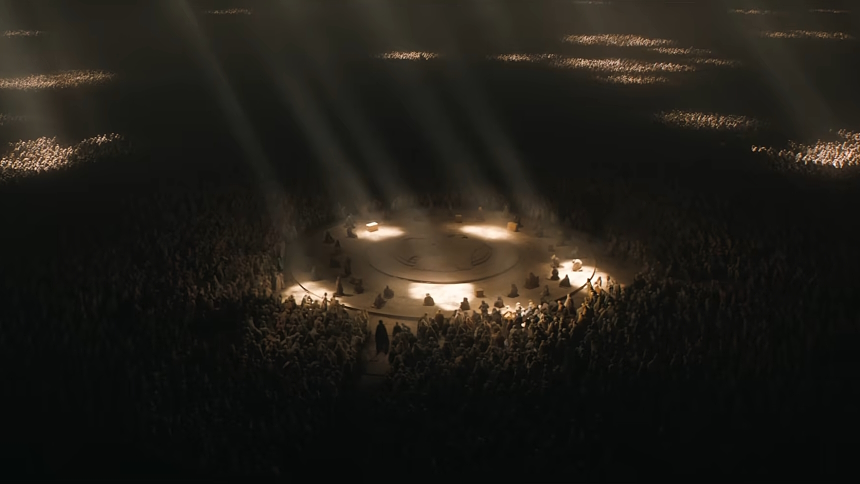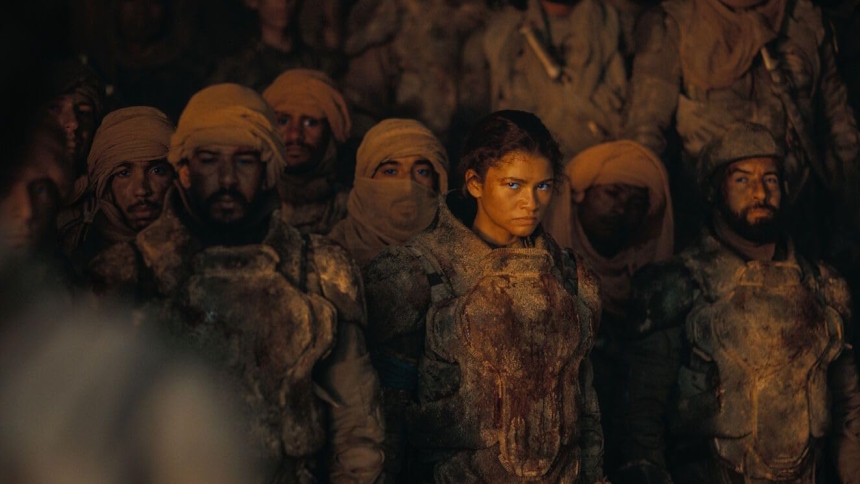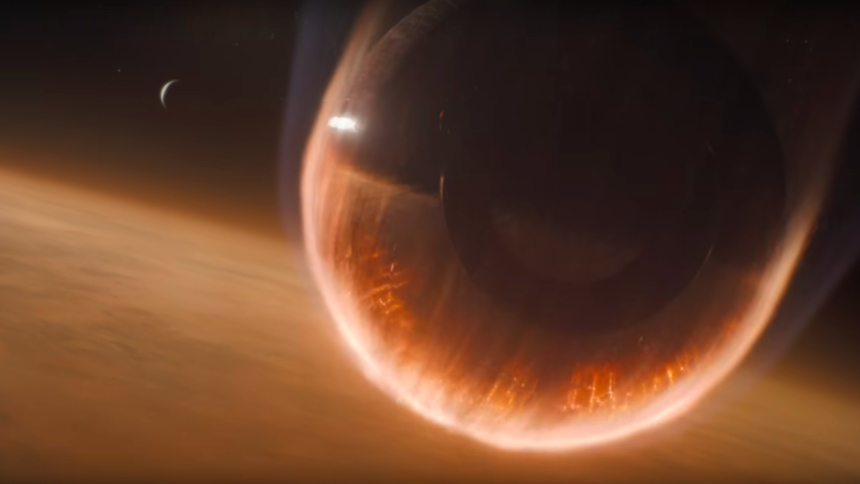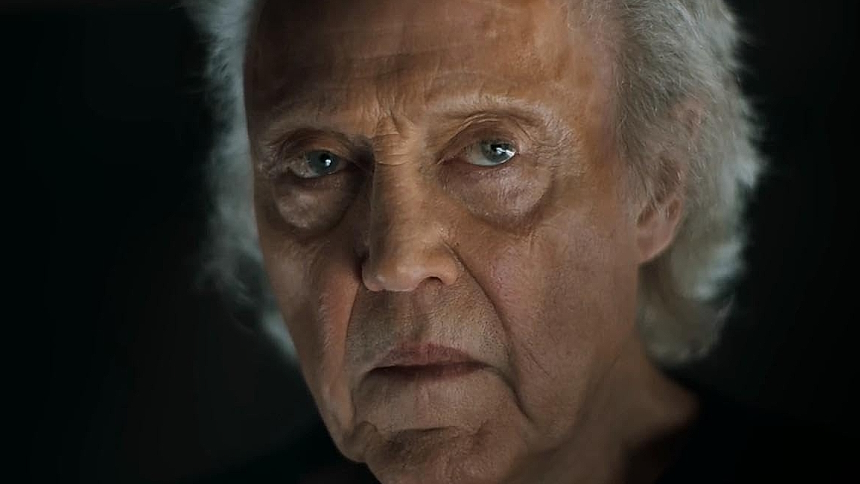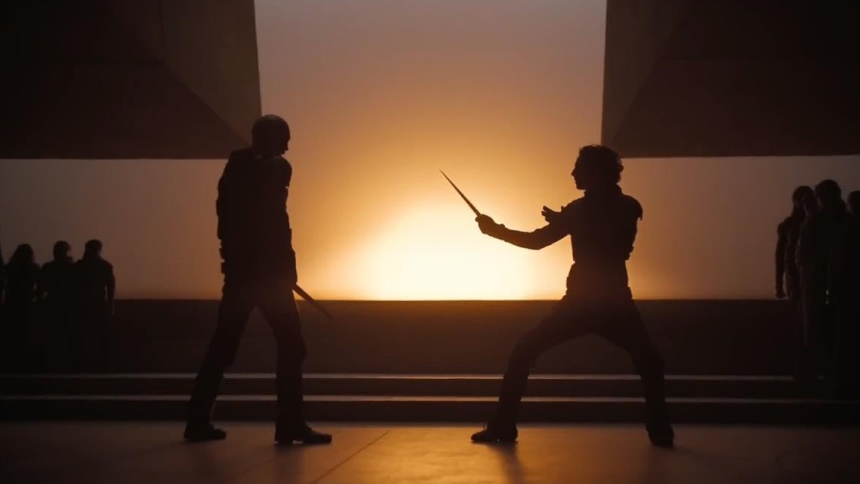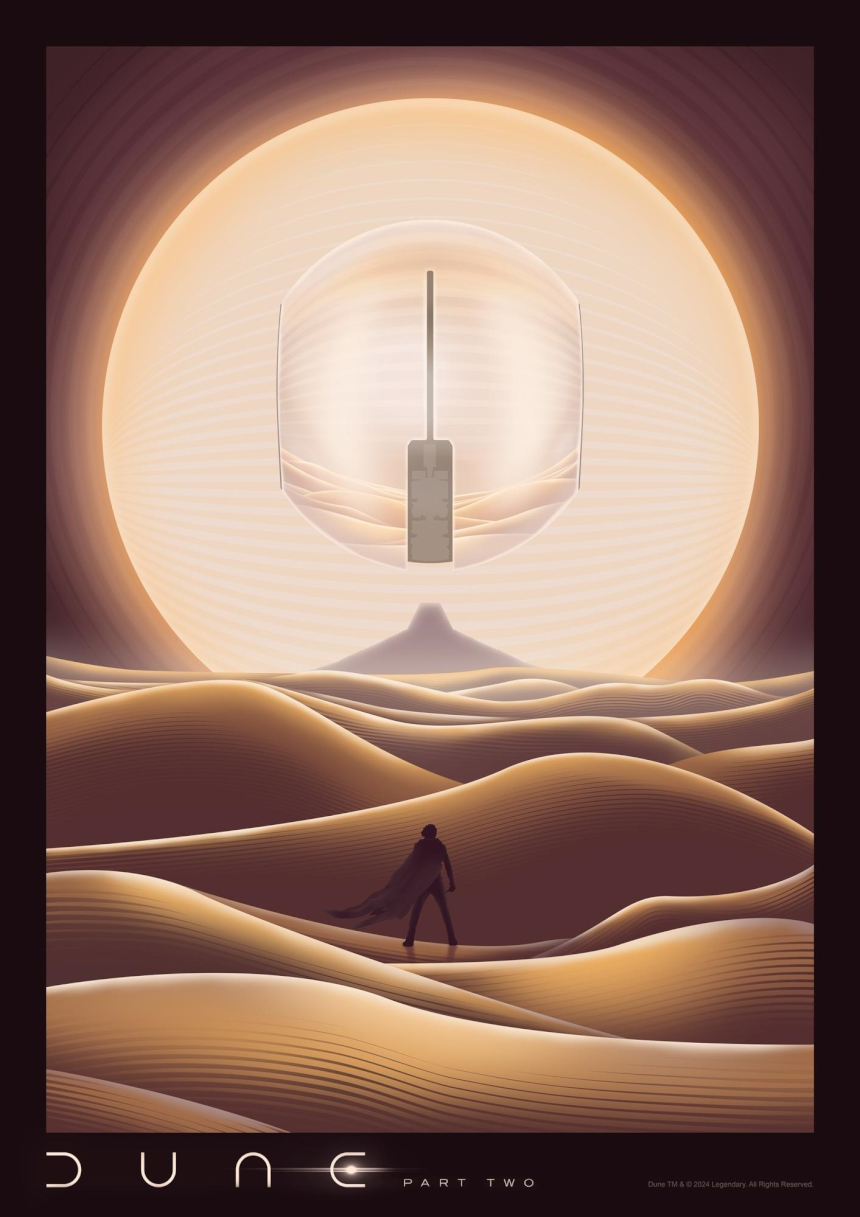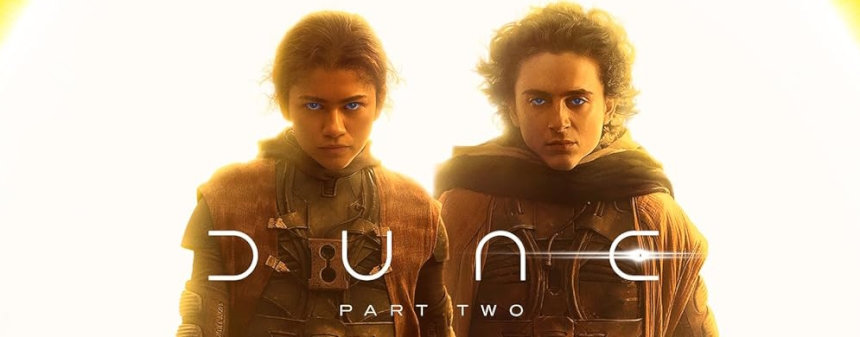 Back when we created our ScreenAnarchy top-10 list of 2021, I lamented the fact that I didn't rally our troops to make a group review for Denis Villeneuve's Dune. Because even though the film topped the leaderboard that year, opinions among us sure were divided.
Back when we created our ScreenAnarchy top-10 list of 2021, I lamented the fact that I didn't rally our troops to make a group review for Denis Villeneuve's Dune. Because even though the film topped the leaderboard that year, opinions among us sure were divided.
Will 2024 see a repeat performance by Villeneuve, now that we get the second half (or second third) of his science fiction epos? Its reception, both critical and at the box office, dwarfs the first film. So I did not make the same mistake again: this time, I asked everyone for their opinions, to make a gallery of them! So here are nine mini-reviews. You can click on the small pictures or on the arrows to move between them.
As always, the writer of the original review can start the article, and this time that is Kurt Halfyard. Instead of settling for a quote from his Dune: Part Two review (or even his Dune: Part One review), he wrote a new piece to accompany it. But check out the others as well, because to mis-quote Paul Atreides: Long Live The Writers!
Kurt Halfyard, Paz O'Farrell, Niels Matthijs, Lia Matthew Brown, Zach Gayne, Kyle Logan, Olga Artemyeva and Jim Tudor
contributed to this story.










Kurt Halfyard, Contributing Writer
Forgive me if I get a bit philosophical here. Film criticism, at its essence, can be boiled down to two questions, “What is the film about?” And “How is the film about it?” Frank Herbert’s Dune is operatic, analog and weird, political, and religious. Dennis Villeneuve’s Dune is barely half those things. Somehow, the inciting incident for the plot itself, conflict between the Emperor’s plans within plans, and the Spacing Guild’s desire to maintain the flow of the substance that runs their transportation business model, is either left to the third part, or removed from the story altogether. That seems like a major storytelling oversight, and the absence undermines much of the conflict we watch unfold. Why are string-pulling, terrifyingly advanced human space-folding brain-slugs excised from the story?
Dune is a gorgeous display of Hollywood resources, one of the finest looking modern blockbuster spectacles, but it still manages to under-deliver on the weirdness or analog, and barely the opera. It is more, as fellow critic Adam Nayman put it so succinctly “a feat of project management,” than the fever-dream, drug addled game of thrones cum jihad of the source material. In our current digital, expedient iPhone existence, it is, I suppose, the movie for our times. That evokes more melancholy than excitement. I wanted dreams, even nightmares, not content. Especially so, given that there is another, recent, expensive desert epic from the same studio, Mad Max: Fury Road which accomplishes just that: a great story with unhinged glee and mania.
Do I want the handsome, and straightforward cultivated aesthetic offered here? Do I want merely stylish iconography, when I have tread the wild, unwieldy, nightmare fuel, tangled forest, of both Herbert’s original novel, and David Lynch’s not-quite-faithful (but somehow more faithful nonetheless) box office fiasco? In short, an adaptation, in my humble opinion, should be more Zardoz, and less Star Wars.
Dune is the modern, ultra-trendy, and instagram ready restaurant which everyone wants to dine, but where the actual food is lacking, well, Spice.
Paz O'Farrell, Contributing Writer
Dune: Part Two is complex and better than its predecessor. Rarely does that happen with a sequel. Perhaps it’s because Dune was mostly concerned with providing the building blocks for the world of Arrakis, and the sequel delivers. The sound production was as striking as the first, with the most notable moments operating in strategic silence. The cinematography is praiseworthy too. There’s an extended sequence in black and white that manages to feel appropriate. The unkempt appearance of big names like Zendaya and Timothee Chalamet also added to this sandy, barren world, and made it easier to forget the actors playing Paul Atredes and Chani.
Paul Atredes (Timothee Chalamet) ends the first film of the saga fatherless, a destitute prince on the run. His mother Lady Jessica (Rebecca Ferguson) is with him, and importantly, with child. They are the victims of a political conspiracy that has set out to remove their House off Arrakis, and the worlds at large. Instead, the House Harkonnen has regained control of the planet and therefore, spice production. The planet Arrakis is covetable precisely because of its natural resource: spice. It’s a slightly hallucinatory powder abundant in Arrakis, where water is lacking and conditions are harsh. The Fremen, indigenous to Arrakis, have found a way to live in and work with the desert and its creatures. Paul Atredes and his mother are slowly integrated into Fremen society over the course of the film. Much of this has to do with a prophecy about the Lisan al Gaib, an outsider who is meant to lead the Fremen to liberation.
Paul and Chani (Zendaya) fall in love, as tension brews between because of the prophecy. Paul, now known as Usul, initially rejects it, humbly agreeing that the Fremen should be in charge of their revolutionary operations. As more people begin to believe he is the Messiah, himself included, the lovers drift. The Lady Jessica also drifts away from Paul, serving as the Reverend Mother, pushing him to accept the mantle as she accepted her own. Another notable mention is the character of Feyd-Rautha Harkonnen, who may also be a potential prospect to the power the Fremen attribute to the Lisan al Gaib. He is Paul’s/Usul’s main adversary in the film, barring the Emperor who orchestrated the fall of his House. Lastly, Florence Pugh is there, as the Emperor’s daughter, except she is not really there. The director Denis Villeneuve is from Montreal, where I am writing this from.
Let me be clear: this movie is well-made. I expected a trite white saviour narrative and was surprised to see the characters contend with that very theme, creating both societal and interpersonal conflicts. It’s all based on an old novel, so maybe this is not surprising, but I did not succeed in reading it, so there’s that. Chani, Paul’s/Usul’s closest bond, becomes the leading force of his opposition as the Messiah. She says, “this is how they keep us enslaved”. The idea is that the prophecy was not written by the Fremen, and that in this way they are kept waiting for salvation as opposed to fighting for it themselves. It’s a very valid point. While I appreciated the inclusion of this debate, it does not change the fact that it is a racist trope we are all too familiar with. The twist is the religious element that seems to justify it.
It’s a made-up religion for a made-up people in a made-up planet, but for all the science fiction, it’s not. The Fremen are coded as Muslim, with darker skin tones than the rest of the characters and fabrics covering their heads. Their land is being exploited for its natural resources. You can’t look at this movie without thinking about Palestine and the ongoing massacre in Gaza. I’m getting political but so is this movie, so is everything all the time.
I'm not a big Dune fan, nor am I a big Villeneuve supporter. I read two of the Dune novels in high school, and I appreciated Villeneuve's Enemy, but I wasn't brimming with expectation when the second Dune film hit the theaters. I liked (but not loved) the first film, mostly because big-budget sci-fi(/fantasy) is rare and you can't say Villeneuve doesn't make an effort when it comes to proper world-building. What I didn't care for was the Dune lore, which is tricky when doing a pretty straightforward trilogy.
The wonder and excitement of getting to explore and experience this distant universe for the first time is absent for obvious reasons. All the introductions were done in the first film, the second one merely continues the plot. The story is grim and political, with clear religious overtones, which is perfect for a more serious and mature sci-fi flick, not so much for a big-budget blockbuster. It's a good thing then that Dune has plenty of fantasy lore to balance things out. From a banjo-playing Josh Brolin to tweens surfing on giant sandworms and mind-altering worm blood, there is plenty of cheese scattered throughout the film.
Balancing these two would've been a real challenge, but Villeneuve doesn't even bother. Everything is handled with the same amount of gravitas and weightiness. The desaturated cinematography and the moody drone score don't leave much room to breathe, the straight-faced performances of the cast are almost comical considering the ridiculousness they're having to plow through. For me, there simply was too big of a discrepancy between the tone of the film and the kitsch on display.
There are other issues, like the tepid action scenes, the accelerated storytelling, and the bland dialogues, but none as irritating as Villeneuve's immutable insistence that you're watching something profound and serious. And to be subjected to 160 minutes of that, only to find out that there's even more to come, was quite disheartening.
If I found Part One too thin on arc and incident to be called a satisfying film, is it churlish of me to find Part Two a bit too far in the other direction? The weight of the second piece of Villeneuve's (all-but-certain) trilogy is so immense that it left me punch-drunk. Well, that's fine: sometimes you go to the movies for nuanced storytelling, and sometimes you go to get sandblasted by Zimmer brahms while some of the most immaculate visual design in movie history supports five of the biggest neo-moviestars on the planet in the midst of their breakout into the big leagues. It's all too much fun to quibble overmuch, even if the sandworm fleshlight popcorn buckets were sold out long before I got to the theatre. The pacing and structure are wonky, but it all builds to such a fremen frenzy (that final battle! That final "love ya babe, but I'm gonna go marry an empress"!!) that Part Two sure as hell feels like the most movie you're gonna get this year. Chani's solo walk in the finale threatens a Part Three that will be equally, if not more so, inevitable in our pop cultural imaginations.
I'm so nonplussed by these two movies that I don't even know what to say. So I'd rather not.
There is a moment early on in Dune: Part Two, where I totally relaxed and just felt happy. It was the shot of Harkonnen soldiers hop-skipping up a cliff wall. It was a pretty picture, a striking image, with booming music, epic outdoors shots, implied danger to the protagonists... and I was there with them, even if it didn't remind me at all of the book.
An adaptation is a change in itself, and I do not think source materials are holy. I'm not in the habit of nitpicking differences between books and films. Hell, the 1995 anime Ghost in the Shell is one of my favorite films of all time and hot damn, did Oshii take some liberties with that one...
That doesn't mean I'm blind to the differences, and it is always disappointing when some of your favorite moments from the book are smushed, squandered or even skipped. Yoo-hoo, space guild? Navigators? Bene Gesserit smack-down? I mean, that curt yell of "Silence" (that's no spoiler, it's in the trailers) was kinda satisfying but not nearly as much as the speech that Paul gives in the book was. However, this is not my Dune adaptation, it is Villeneuve's. He has taken a few points from the book, and he leans the rest of the narrative, and even that entire universe, fully into it, with added hindsight of what Herbert wrote afterwards. The end of Denis Villeneuve's film shouldn't make us happy that Paul is a "Messiah", we definitely shouldn't rejoice his wins. We should be anxious, dreading the worst to come. And as such, I respect the changes Villeneuve made, even big ones to main characters like Chani. His ending deviates from the book, but I expect its purpose is to crash us all, all the harder, into film three in a few years. And that's fine. I'll be waiting. This one was worth the wait, I'm sure the third one will be worth the wait too.
Kyle Logan, Contributing Writer
Dune: Part Two is a jaw dropping piece of cinema. It’s a monumental film that revels in the stunning work of production designer Patrice Vermette, framed beautifully and forebodingly by Villeneuve and cinematographer Greig Fraser. It’s an enveloping experience that draws us in with the remarkable sound design by Dave Whitehead and another “BWONG”ing score from Hans Zimmer.
Sadly though, the nearly three hour film isn’t just an audio-visual extravaganza and has to tell a story too. That story is just as fine as the story of the book that birthed it, always secondary to the world building but delivering the requisite operatics of a grand-scale space opera and moving the plot into the battle sequences that contribute to making the film a marvel.
Less sad and more frustrating is the film’s decision to rob the novel of the minimal amount of thought-provoking it did by significantly changing its final section to ensure that viewers couldn’t possibly get the wrong idea about what’s going on in the film. Ending the sumptuously brutalist film on a note of capitulation to our moment’s failing media literacy more than anything spectacular.
Olga Artemyeva, Contributing Writer
When Denis Villeneuve’s Dune: Part One emerged, I strongly disliked it. Timothée Chalamet seemed miscast as Paul Atreides, and mostly looked lost. The script (hilariously nominated for an Oscar) has literally turned a wonderfully weird and meticulously detailed universe of Frank Herbert into a bland stub of a film, where the only characterization the heroes ever got were the typecasts of most actors.
Most of all, the director seemed disinterested in any scene that wasn’t a closeup of Chalamet’s face and some bulls, or his trademark wide shot with someone standing against something large, monumental and vaguely symbolic (also see: the giant boobs of Blade Runner 2049). Every time something reminding an action scene started, the same thing happened over and over: wide shots of people running or something flying somewhere were followed by a couple of clarifying closeups, then the smoke blessedly filled the screen – aaand cut to a closeup of Chalamet and the bulls.
Does it get any better in Part Two? It does for a bit, and then it doesn’t. The good news is that Villeneuve does find some bits that get him excited in this part of the story. What doesn’t change: I still believe Villeneuve is not the right director for Dune. For one, he’s not bizarre enough to go full batshit with this material. And then, for all his discovered love of closeups, he clearly isn’t a fan of really looking into his characters.
Herbert’s Dune was always a tragic story about how dictators are born out of the oppressed, the impossible choices, the road to hell paved and all. In Villeneuve’s version, Paul goes through the motions, but his main transformation gets lost amidst the epic scale (same with the “love” story that just kind of happens). It's like a time machine exists, and it’s 2005 again, and after hours of screen time of a space opera we get to the part that explains how a generally okay guy with a cool girlfriend and questionable haircut turns into a genocidal asshole. Oh, and the answer is still: eh… cause that’s what the script says?
Dune: Part Two both stands and falls as a full-on massive follow-up to Villeneuve’s 2021 Part One, itself gloriously and unapologetically in synch with the weighty tone of Frank Herbert’s seminal novel. One’s comprehension of what the heck is what in the plot depends, on every level, on the viewer’s investment in the material.
When Part One opened, I wrote that “The through-lines of space travel, central sand planets, rebellions, evil empires, political allegory, and even Chosen Ones are all indeed present, though it altogether lacks any aspect of character magnetism or dash. It’s hard to become invested in the plight of young royal subject Paul Atreides (Chalamet) and his loving mother, Lady Jessica (Rebecca Ferguson of Mission: Impossible fame) when they are kept at such arm’s length and decked out in Teflon”.
Compared to the remoteness that I felt that was baked into the wildly ambitious first film, I’d say that Part Two, by comparison, does better. There’s an effective uneasiness in watching both Paul and Lady Jessica slowly slip away into differing cultic behaviors. In other words, they’re still decked out in Teflon and with black nose hoses to boot, but the fact that we do feel something can only mean that Part One was more successful than previously assumed, and that Part Two has more to offer. Just what exactly is being offered remains a nearly impenetrable conundrum, but again, we’ve been led to expect exactly that. Factor in Zendaya’s fully emerged and terrifically prominent religious sceptic and love interest of Paul, and Part Two is that much greater.
And there you have it: our different views, long and (very) short, on Dune: Part Two.
All opinions are valid in their own way, and so is yours. What did you think about Dune: Part Two? Or Dune: Part One? Or David Lynch' 1984 Dune for that matter? Please leave your own impression of this film on our social media pages, which we have on Facebook and Twitter!

More about Dune: Part Two
More about Dune
Around the Internet
Recent Posts
Leading Voices in Global Cinema
- Peter Martin, Dallas, Texas
- Managing Editor
- Andrew Mack, Toronto, Canada
- Editor, News
- Ard Vijn, Rotterdam, The Netherlands
- Editor, Europe
- Benjamin Umstead, Los Angeles, California
- Editor, U.S.
- J Hurtado, Dallas, Texas
- Editor, U.S.
- James Marsh, Hong Kong, China
- Editor, Asia
- Michele "Izzy" Galgana, New England
- Editor, U.S.
- Ryland Aldrich, Los Angeles, California
- Editor, Festivals
- Shelagh Rowan-Legg
- Editor, Canada


